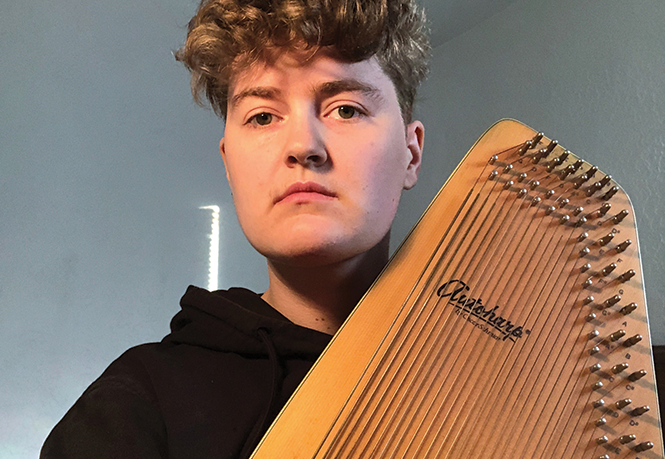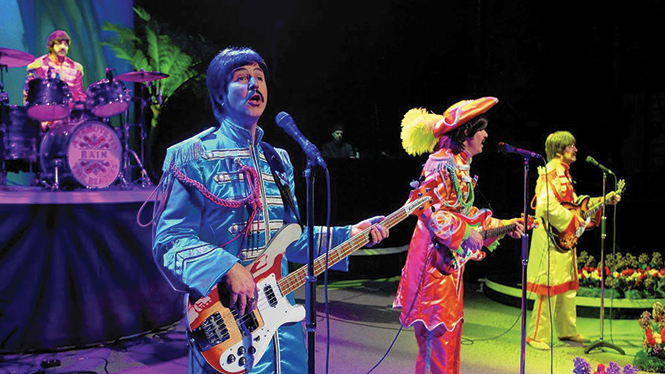
- Ysa Pitman
Pitcher Plant Releases Ghost of the Weed Garden
It seems these days that artists rarely choose a name that reflects the kind of music they make; too many ironic names abound. But the name Pitcher Plant—the title of the solo project by local Ysa Pitman—is perfect for this surrealist autoharpist. Her recent burst of three singles, released as Ghost of the Weed Garden, is a lovely little preview of what this artist has in store, hopefully by way of a full EP release later this year. Fans of Joanna Newsom or early St. Vincent will find some similarities here, in part due to the fanciful and beguiling sounds built by the autoharp that Pitman plays, but also by way of whimsical appearances by violin, horn and cornet. However, Pitman veers away from any of the tepid strangeness of the two aforementioned artists, and into a more brash, plain-delivered poetry—such as when on "Pit," she shrieks "going into the pit / spit it out, let it in!" With some parts arranged by Provo producer and multi-instrumentalist Bly Wallentine, the songs smack of a certain kind of Utah weirdo folk pop, likely in part thanks to Wallentine's Studio Studio Dada fingerprints. But it's also due in part to a small legacy of classically-inspired experimental artists here who all seem to collaborate and inform each other. Fans of locals like Sen Wisher or Little Moon will hear what I'm referring to. It also might just be because the autoharp sounds warm and familiar, modest and approachable, as much as it also sounds futuristic-medieval. These fantastically woven tones and forms perfectly match the low and even voice of Pitman on the third and final single, "Well Wisher." On that song, it really does help evoke the imagery of the self-aware lyrics "I'll be your well-wisher from afar / too much pressure for you to be what I want for me / I was aware of the score from the start / you got a castle round your head, round your heart / it's who you are." On the title-track, Pitman plays with language, singing "tailored maid, tailor-made / a tolled bell, a told belle," and evokes the project's name in lyrics like "here comes the ghost of the weed garden / pitcher's broken and the well is dry." However, it doesn't really sound like Pitman's creative well is dry at all. Pitcher Plant is luscious and full—as that kind of plant tends to be—of viscous potency capable of breaking things down. Listen at pitcherplant.bandcamp.com
Nicky V A releases Slow Death! In the Desert
This here is the first of two Old West albums up for review this week, but the two couldn't be more different. Local Nick Anderson, who runs the local experimental and found cassette label, Far Out Cassette Club—and who we profiled last year in association with his distinct tape-obsessed efforts—also makes music of his own as Nicky V A. His previous release available on faroutcassetteclub.bandcamp.com is from 2019, a lo-fi recording that leans into minimal, slowly-delivered synth parts that evoke images of lonely, distant parts of space. Meditative, maybe crafted with tripping in mind, it couldn't be farther flung from this new release, Slow Death! In the Desert. The title is a delight—it seems to be a reference to the meme that was long ago generated from the absurdist band Panic! At the Disco—and also immediately marks it as an addition to the slightly ironic genre that I'm going to call here, for fun, nü-cowboy. Local examples of this millennial obsession with all things shoot-'em-up include artists like Pony Logan, who last year released an album that combined hyperpop glitchiness with Y2K country music themes. One could argue that the country hubbub took off with queer indie artist Orville Peck, who has a song about men in Salt Lake City calling him "pretty." Peck is present here in Slow Death! In the Desert, if only because, like him, Anderson really sticks to all the sonic traditions of "spaghetti Westerns," with an opening track that's all windchimes and the dry, arid whistling sound that calls up yellow imagery of a cracked landscape dotted with spent shotgun shells, the silhouette of a noble lone gunslinger in the distance. On the title track, Anderson sings lowly that slow death in the desert is all he knows: "out on the horizon, just a distance away / a pale horse is waiting / for when it's my turn to pay." Native American flute turns up, a cliché to impart the vastness of Anderson's cowboy's killing desert. Plaintive guitars amble throughout, though on closer "done failin," they waver with a just-out-of-tune warping likely an intentional choice by the tape-glitch obsessed Anderson. On "2 buck chuck," heartbreak is dealt with by getting "fucked up" on the cheap Trader Joe's brand of wine, to deal with having put his foot in his mouth. While there are probably many reasons that the winking camp of nü-cowboy has taken off in the last year, albums like Slow Death! In the Desert make one think that maybe we're all just lonely cowboys wandering through this deathly desert of a pandemic—and that there's a happy ending sunset waiting for us.

- Alas Blancas Music
King Thurber Releases While Thinking of You
Our second country album this week is a touch more traditional. Local Utah folk artist King Thurber defines his recently-released While Thinking of You as a "quiet album of mandolin and guitar," and it certainly is that. But with its lineup of original songs and covers of well-known songs, it's lively, too. The March 1 release is the kind of humble folk that sounds like the West, or some version of it you can often find tinkling from an open door or three on some thin street of one of the West's many old, preserved boom towns. "The Wildest Horse" is a lonesome cowboy ballad about love's wandering ways, delivered by Thurber in a modest, earnest and only slightly weary voice. At the end of the album, the song is revisited in a Nashville-ified reprise assisted by local Jesse Thurgood—and that time around, Thurber's voice soars a little stronger, while mandolin warbles distinctly behind him like a friendly bird. Thurber's true-blue Western Man troubadour-isms continue on songs like the romantic title track, which gathers into sweeping roses-for-the ears, thanks to a violin assist from Utah-associated contemporary folk legend Kate MacLeod. She also features on some of the other instrumental tracks on the album, including "Roses for Annie" and the opening track "Merridy's Ayre." With Thurber's quick-strummed cover of the Beatles classic "Blackbird," he manages to make the song sound like it always should have been played thus, on humble, folky strings with the wry voice of Thurber delivering the famous lyrics in a low, but bright voice. He also folkifies another American rock song, with a cover of The Youngbloods' "Darkness, Darkness"—a purely and heartily strummed instrumental take. But Thurber's takes on classics don't just stop at rock 'n' roll; they proceed onto, well, classical, with his rendition of Bach's "Jesu, Joy of Man's Desiring." Thurber turns the song—which at this point feels deeply associated with all things fancy and fine—into an expertly plucked acoustic lullaby of sorts, as the familiarity of the song rouses and the soft guitars lull. Altogether, King Thurber's While Thinking of You adds to the nostalgic tradition of dusty Americana music that still gleams with a patina of tradition and well-worn care. Stream it wherever you stream, or visit kingthurber.com to buy.

- Cylla von Tiedemann
Live at the Eccles Presents RAIN! at Maverick Center
The Eccles Theater and the Maverick Center are making a comeback together this spring, signaling the kind of optimistic move shared by many folks in the entertainment industry these days. While COVID is nowhere near gone, cases are down and many Utahns have since been vaccinated—though far from all, of course. And cover shows seem to be the order du jour, or more like the order of the past year. Smaller venue and booking company S&S this past year put on a series of cover shows with Beatles and Bowie focuses, to much success. For their part, the Maverick Center date will feature the touring tribute show Rain, featuring a band made up of mostly self-taught musicians, and two Beatles superfans who grew up on the stuff, a former ukulele luthier and a classically-trained jazz artist. All four of them dress the part in Sgt. Pepper-era garb, and have toured their show all over the world—one member, Steve Landes, was even part of the famed Beatles Broadway cover show Beatlemania. The group had tour dates all over the country before the pandemic, all of which were canceled or postponed. Now, some of their 2021 postponed dates remain so, but not this upcoming local date at the Maverick Center. It's a lucky break for fans of the Beatles, or just of spectacle, for this is sure to be an exciting show after a year of canceled opportunities to catch such arena acts. It is curious, though—of all the kinds of shows that seem to have popped back up or persisted in the last year, I've found myself writing about a lot of cover sets. What is it about the cover show that appeals to so many? The dependably familiar hits? Or the novelty of rock 'n' roll soft-drag? I don't know the answer, but it's a fascinating phenomenon, and one that maybe proves the persistent popularity of these classic acts even after their own prime, even during a pandemic. Rain stops in SLC for three dates, on Friday, April 9 at 8 p.m., and twice on Saturday, April 10, at 3 p.m. and 8 p.m. Tickets are accessible, ranging from between $30 to $60, and more info can be found at live-at-the-eccles.com.
Song of the Week: "Can't Hardly Wait," by The Replacements
Folks, coming up this weekend is my second pandemic birthday, so I'm treating myself to talking about my very favorite song. It is a thorny song by a thorny band, the best example of seminal bad-boy rockers The Replacements, at their most poetic: "Can't Hardly Wait." Written by the grimy frontman Paul Westerburg, it's my favorite for many reasons, but mostly because it shimmers with an eternal edginess, the kind you get from a nervous, forward-looking hope and the trembling uncertainty of youth. It's also because the song has about a half dozen different versions, since Westerburg, though a talented songwriter, was a famous lyric-forgetter. Yet all of the different sets of lyrics (the original 1985 Tim recording, featuring Alex Chilton on backing vocals; the soul-torn acoustic on the deluxe version of Tim; the official, horns-assisted release from '87's Pleased to Meet Me; and on and on) do find union. On the first version—alongside triumphant electric guitar that makes it my favorite interpretation—Westerburg raggedly promises to write someone a letter, and not to "blow the address again." On the acoustic, he sings mysteriously instead that he'll "be there in an hour / it'll take at least two weeks there on foot." On all versions, Jesus rides beside Westerburg, a disapproving shoulder angel in a drugs 'n' booze-filled tour van full of "ashtray floors, dirty clothes and filthy jokes." And while sometimes it's Jesus yelling "hurry up!" and asking if they haven't had enough of "that stuff," elsewhere, it's Westerburg making the demand, howling that he has. At the time of the song's writing, in 1985, the band was on the cusp of making it big, but kept violently, drunkenly, goofily self-sabotaging important gigs due to growing insecurities and fear of responsibility. Here, the high highs and hungover lows of one of rock's wiliest bands sound out as both a celebration and a lament. Whether it's from the top of a "scummy water tower" or "home when I'm sleeping," Westerburg's climactic sentiment is always that he "can't hardly wait"—to, I think, put the restlessness to rest, to pin down fulfilment. Westerburg sees it in "lights that flash through a crack in the drapes," chases it "through a hole in the gate," and with each lyrical shift, it's clear that fulfilment and the pursuit of it are always changing. That such a truth gets carried along by a song catchily delivering a sound as daring, earnest, worried and changeable as The Replacements always were, is just a bonus.